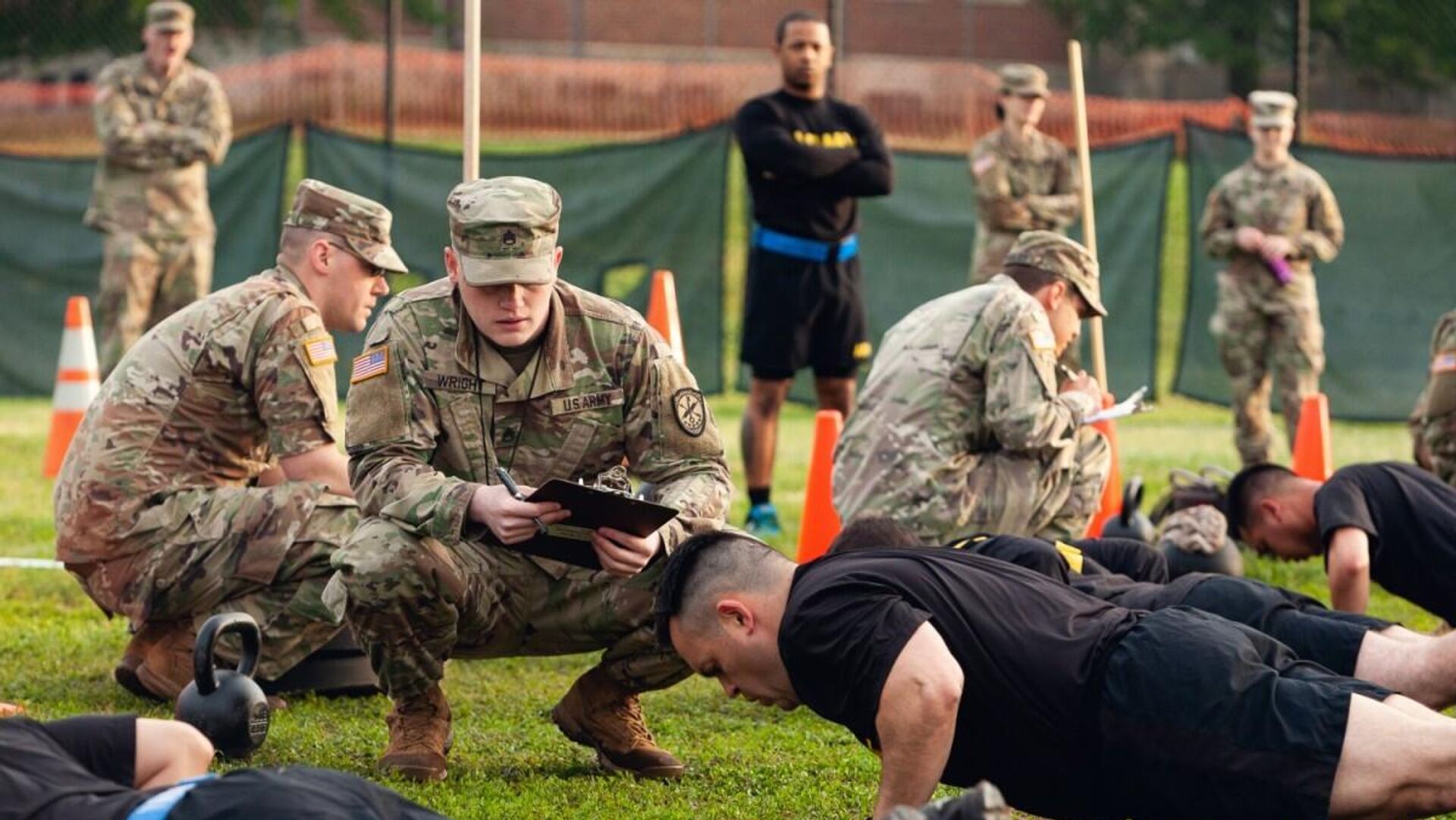https://sputnikglobe.com/20220507/us-military-might-face-lack-of-recruits-due-to-obesity-issues-research-says-1095332252.html
US Military Might Face Lack of Recruits Due to Obesity Issues, Research Says
US Military Might Face Lack of Recruits Due to Obesity Issues, Research Says
Sputnik International
The researchers recall that as many as 40% of adults and 18% of children in the US suffer from obesity. They suggest that a lack of proper nutritional... 07.05.2022, Sputnik International
2022-05-07T11:39+0000
2022-05-07T11:39+0000
2022-05-07T11:51+0000
us
obesity
us military
https://cdn1.img.sputnikglobe.com/img/07e6/05/07/1095332212_0:0:1201:676_1920x0_80_0_0_c66ea53092163443f12511dc8c70fdfa.jpg
The US military might face personnel shortages and even a reduction in its mission readiness due to continuing obesity issues in the country, research published in the Journal of Nutrition Education and Behavior has suggested.One of its authors, nutrition specialist and Assistant Professor at the University of Kentucky College of Medicine, Sara Police, warns that an increase in the number of calories in food and bigger portions have resulted in weight gain in the US. This in turn has reduced the number of men and women, eligible for service, who pass the military's standards for percentage of body fat.According to the research, the number of men who exceed the maximum BMI (body mass index) specified in the military standards has doubled since 1960. For women, these numbers have tripled, the paper said.Apart from calorie-rich nutrition, food insecurity and changing US demographics also impact the number of suitable recruits, Sara Police noted. Basic training regiments increasingly recruit women, as well as racial and ethnic minorities. All these groups often suffer from food insecurity – lack of access to healthy food, and as a result – obesity, the researcher noted.Police proposed several ways how these issues can be resolved. She firstly suggested that military leaders, such as drill sergeants, commanding officers and non-commissioned officers play a role in promoting nutrition education within the armed services themselves. Such education will have lasting impact on soldiers and might prevent them from gaining weight after their basic training or active duty is over, the research said.Additionally, US schools might contribute to the fight with obesity by removing less healthful food options from their menus and expanding the programmes offering free or reduced-cost lunches for their students.The research recalls that some 40% of adults and 18% of children in the US suffer from obesity to some extent, according to National Center for Health Statistics findings from 2016. The Healthy People initiative of the US Department of Health and Human Services established that there was little if no improvement in the situation as of 2020 and the goal to reduce these percentages persists in the initiative's plans for 2030.Let's stay in touch no matter what! Follow our Telegram channel to get all the latest news: https://t.me/sputniknewsus
Sputnik International
feedback@sputniknews.com
+74956456601
MIA „Rosiya Segodnya“
2022
Tim Korso
https://cdn1.img.sputnikglobe.com/img/07e6/03/0d/1093831826_0:0:216:216_100x100_80_0_0_e3f43a960af0c6c99f7eb8ccbf5f812c.jpg
Tim Korso
https://cdn1.img.sputnikglobe.com/img/07e6/03/0d/1093831826_0:0:216:216_100x100_80_0_0_e3f43a960af0c6c99f7eb8ccbf5f812c.jpg
News
en_EN
Sputnik International
feedback@sputniknews.com
+74956456601
MIA „Rosiya Segodnya“
Sputnik International
feedback@sputniknews.com
+74956456601
MIA „Rosiya Segodnya“
Tim Korso
https://cdn1.img.sputnikglobe.com/img/07e6/03/0d/1093831826_0:0:216:216_100x100_80_0_0_e3f43a960af0c6c99f7eb8ccbf5f812c.jpg
us, obesity, us military
US Military Might Face Lack of Recruits Due to Obesity Issues, Research Says
11:39 GMT 07.05.2022 (Updated: 11:51 GMT 07.05.2022) The researchers recall that as many as 40% of adults and 18% of children in the US suffer from obesity. They suggest that a lack of proper nutritional education as well as access to healthy food in general greatly contributes to the issue.
The US military might face personnel shortages and even a
reduction in its mission readiness due to continuing obesity issues in the country,
research published in the Journal of Nutrition Education and Behavior has suggested.
One of its authors, nutrition specialist and Assistant Professor at the University of Kentucky College of Medicine, Sara Police, warns that an increase in the number of calories in food and bigger portions have resulted in weight gain in the US. This in turn has reduced the number of men and women, eligible for service, who pass the military's standards for percentage of body fat.
"This is a complex problem that has a deep impact on national security by limiting the number of available recruits, decreasing re-enlistment candidacy, and potentially reducing mission readiness," Police said.
According to the research, the number of men who exceed the maximum BMI (body mass index) specified in the military standards has doubled since 1960. For women, these numbers have tripled, the paper said.
Apart from calorie-rich nutrition, food insecurity and changing US demographics also impact the number of suitable recruits, Sara Police noted. Basic training regiments increasingly recruit women, as well as racial and ethnic minorities. All these groups often suffer from food insecurity – lack of access to healthy food, and as a result – obesity, the researcher noted.
Police proposed several ways how these issues can be resolved. She firstly suggested that military leaders, such as drill sergeants, commanding officers and non-commissioned officers play a role in promoting nutrition education within the armed services themselves. Such education will have lasting impact on soldiers and might prevent them from gaining weight after their basic training or active duty is over, the research said.
"This [research] draws on previous studies illustrating that accurate nutrition information and behavior modeling could strongly influence recruits", the research paper said.
Additionally, US schools might contribute to the fight with obesity by removing less healthful food options from their menus and expanding the programmes offering free or reduced-cost lunches for their students.
The research recalls that some 40% of adults and 18% of children in the US suffer from obesity to some extent, according to National Center for Health Statistics findings from 2016. The Healthy People initiative of the US Department of Health and Human Services established that there was little if no improvement in the situation
as of 2020 and the goal to reduce these percentages persists in the initiative's plans for 2030.
Let's stay in touch no matter what! Follow our Telegram channel to get all the latest news: https://t.me/sputniknewsus 



